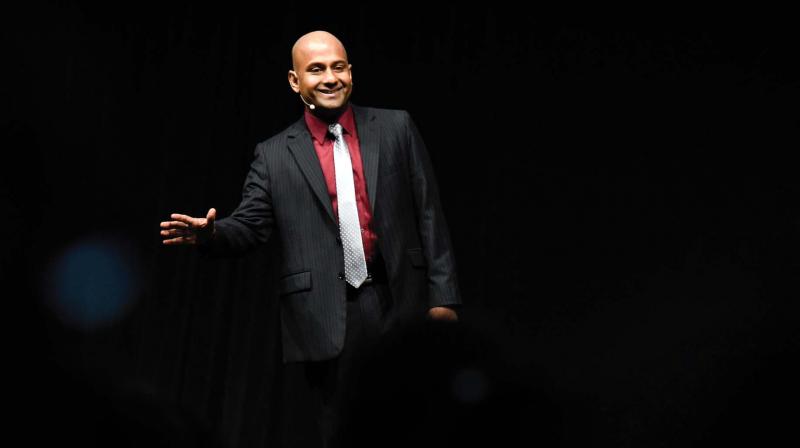All about confidence
Manoj Vasudevan shares the secrets of becoming an extraordinary person.

The next speaker is introduced, the topic is announced, ‘We can fix it’. A smiling face in a suit comes on stage, bows politely and as you, like a regular view, prepare to judge this man, his body language changes. A clean-shaven Manoj Vasudevan throws his hands out, walks forward, adapts a dramatic tone for his story that begins with, “I was 24 years old, living in India, I had a nice job, nice car, nice… (pauses, touches the clean shaven head) hair.” The first laugh comes then. The laughs would repeat every few moments in the next seven minutes it took to finish his speech. That year – 2015 – that speech brought him the third place at the World Championship of Public Speaking, organised at the Toastmasters International Convention in Las Vegas.
This year, he came in first place, speaking on global conflicts and beating contestants from 142 countries. In a phone call from Singapore, Manoj, who hails from Thiruvananthapuram, Kerala, speaks of his early days when life had been a totally different game. He was an IT man who became a leadership coach and began his own company in Singapore. “I studied in Christ Nagar School, went to Government Arts College for pre-degree and then the College of Engineering, Thiruvananthapuram, for Electronics Engineering,” Manoj says in the same Indian accent that never left him. Or one that he never chose to leave. “I don’t believe you need to change your accent. As long as you can convey the idea to the audience, words don’t matter,” he says.
But the accent inhibits Indians, so does grammar and pronunciation. “In India we tend to look down upon ourselves and others because of accent. But in the global perspective, there is only one global language. If you know more than one language, you are bound to have an accent,” Manoj says, giving a different perspective. He also has an interesting take on introversion. “In my research, I found that people who are introverted tend to be better speakers. Because they think before they speak. Extroverts on the other hand are people who speak and then think.” He has been an introvert too, is still reserved, he says. The biggest inhibition perhaps comes from people judging you.
“But I realised the importance of speech after Obama became the US president. Just by the power of his words, he became the most powerful man in the world.” They all have techniques, Manoj observes. Be it Obama or Shashi Tharoor, the articulate MP from Thiruvananthapuram. Manoj says he analyses speeches to understand that. It took him time to be this good. And he worked in every way to be so. Manoj used every opportunity at the places he worked in – meetings and all – to speak. This began somewhere in 2004, he says. He noticed that in the company he worked for then, the boss took the biggest salary, several times more than the others. And that struck Manoj as interesting considering how the boss had been a physical education instructor.
“It was his ability to bring people together and get things done. I wondered why I studied engineering. If I had been a physical education instructor, I would at least have had a good physique,” Manoj says, humour coming easily even into his casual talks. It had not been so earlier. The first time Manoj tried a joke in his speech, it had not worked. So he asked the funniest person in the room how he made people laugh. “I learnt some techniques from him, the right pause and everything, and I started adding humour to my speech.” He became so good at it that he had a brief stint at stand-up comedy too.
And then the contests began – the first Singapore-wide contest in 2010 that he won. He then went for the international championships for a couple more years before winning third place with ‘We can fix it’. Confidence is what does it, he says, because people associate that with competence. Even if you are not sure about a topic, if you speak confidently, it will work. You need to build skills though, which according to him are the ability to connect, communicate, network, read and influence. With these tips, he began coaching others on leadership, began his consultancy Thought Expressions, and wrote a book on how ordinary people can be extraordinary.

